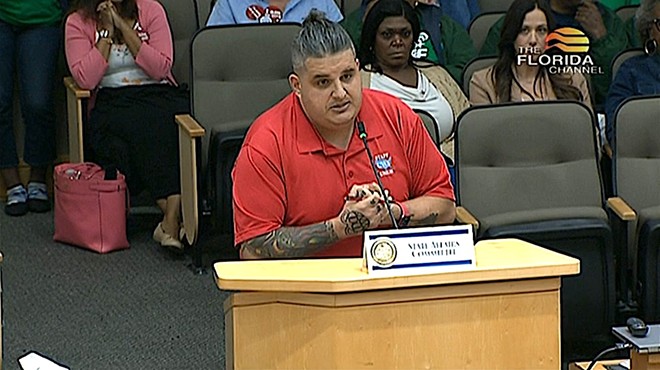
Civilian employees in the Orange County Sheriff’s Office, including automotive technicians and fleet specialists, voted to dissolve their union in May, becoming the first employees in Florida to do so following the adoption of a sweeping anti-union law last year that has already caused over 50,000 public employees to lose their union representation.
Although these civilian workers in the Sheriff’s Office first voted to unionize back in 2021 with nearly 85 percent support, the union — represented by the American Federation of State, County, and Municipal Employees (AFSCME) — was forced to hold a rerun election this year due to having fewer dues-paying members than is now legally required under Florida law.
While the new law (Senate Bill 256) contained a controversial carve-out for law enforcement and firefighter unions, this carve-out does not extend to unions made up of primarily civilian employees, even if they work alongside sworn officers.
According to state records, the local union's rerun election, held May 21, resulted in a close vote: Out of 55 eligible voters in the Sheriff’s Office union, 20 employees voted to keep their union intact, while 24 employees voted to dissolve their union. Other sworn personnel in the Sheriff’s Office, including deputies, corporals and sergeants, are unionized with the Fraternal Order of Police, and are unaffected by this vote.
When reached for comment on the vote Monday, AFSCME Florida — a union that has already lost over two dozen local unions since the enactment of the new law — said they were “disappointed” by the results, but say they wish to keep the door open for employees who might wish to consider organizing with them again in the future.
“We are disappointed to have lost such a close recertification election, especially one where there was so much confusion as to why it was taking place and what was at stake,” an AFSCME Florida spokesperson told Orlando Weekly in an emailed statement.
“AFSCME members have been overwhelmingly successful in retaining their contracts but in this case the union-busters behind SB256 and other legislation have scored a victory. We wish these workers the best and will stay in touch with our leaders to assess if they want to pursue re-forming their union in the future.”
The Orange County Sheriff’s Office, meanwhile, claims their staff's vote shows employees believe they'd be just fine without a union. “We believe this [vote] reinforces the strong relationship we have with our employees, and the members decided to discontinue the union knowing they already enjoy good working conditions and fair pay,” a Sheriff's Office spokesperson told Orlando Weekly over email.
The spokesperson confirmed that, with the employees' dissolution vote, the union's active contract with Sheriff's Office is “no longer in effect,” meaning they'll receive the same benefits and salary adjustments as other nonunion civilian employees.
“We don’t anticipate any negative effects from this, since the AFSCME members themselves did not want to continue as a union,” the spokesperson shared. Orlando Weekly requested a copy of the union's most recent union contract with the Sheriff’s Office, but neither the union nor OCSO complied or acknowledged the request.
According to old social media posts, the union approved their first contract with the Sheriff’s Office in Oct. 2022, but it's unclear whether they've negotiated another contract since. “Thank you to everyone involved for their leadership and professionalism during this process,” a 2022 post on X (formerly known as Twitter) by the Sheriff’s Office read.
This morning, @SheriffMina and Angel Gonzalez, President @AFSCME Florida Council 79, ratified the first collective bargaining agreement their negotiation teams worked on. Thank you to everyone involved for their leadership and professionalism during this process. pic.twitter.com/FCy5CTrm1p
— Orange County Sheriff's Office (@OrangeCoSheriff) October 7, 2022
The new anti-union law, considered a priority of Florida Gov. Ron DeSantis last year, was over a decade in the making, backed by corporate-funded groups like the American Legislative Exchange Council (ALEC) that have pushed for similar union reform policies in other states through their partnered organizations and elected allies in state legislatures.
While the Florida bill made several wonky changes to state rules governing public sector unions, the broad strokes of the law essentially force unions to have more dues-paying members, while simultaneously making it harder for them to do so.
Under Florida’s nearly century-old “right to work” rule, and a reinforcing U.S. Supreme Court ruling in 2018, no public employee who is represented by a union can be forced to pay union dues — which serve as fees that support a union’s work. Paying union dues, even in a unionized workplace, is thereby voluntary.
Under the new state law, however, at least 60 percent of workers in a union must pay dues in order to remain a state-recognized union. Unions that report membership numbers under 60 percent must either petition the state for a rerun election — known as recertification — or else be automatically dissolved.
At least 16 local unions across Florida so far that have had these rerun elections, including 11 unions affiliated with AFSCME, have voted to keep their unions intact. The other five are local teacher and non-instructional educational staff unions in Columbia, DeSoto, Hernando, Escambia and Calhoun counties where employees also voted to keep their unions alive for at least another year. Under the new law, if they're still under 60 percent dues-paying membership during their next annual reporting cycle, they'll have to go through the same election process again.
Teachers unions were broadly considered the target of last year’s law, as a powerful force in Florida’s labor movement that DeSantis frequently vilifies. Although the statewide teachers union — the Florida Education Association — largely endorses Democrats for office, and has spoken in opposition to many of DeSantis’ culture-war policies concerning book bans and censorship in schools, many of its members are Republicans.
Some teachers union leaders and proud members in redder parts of Florida have publicly described themselves as conservative, or registered Republicans, in personal testimony to lawmakers where they have denounced the new anti-union law.
According to state records, more than 60 local unions have been dissolved as a result of the law so far, affecting more than 50,000 public employees and their union contracts, which generally include provisions guaranteeing pay raises and other workplace benefits and protections. None of the dissolved or decertified unions so far have been teachers' unions.
Locally, other unions that have been dismantled since the law’s passage (not through an election process, but because they were abandoned or deemed noncompliant) include unions representing non-instructional staff at the University of Central Florida, blue-collar trades workers for the Greater Orlando Aviation Authority, utility workers employed by the city of Sanford, non-instructional staff in Volusia County Public Schools, and hundreds of city workers employed by the city of Daytona Beach.
Despite this, new organizing happens too. While Orange County Sheriff's Department employees opted to cut ties with AFSCME Florida, a small group of medical staff in Osceola County's Corrections Department last month — including medical and dental assistants, certified nursing assistants and others — voted unanimously to join AFSCME, while a smaller group of higher-ranking or supervisory medical staff in the same department narrowly voted 3-2 against unionizing that same day.
Subscribe to Orlando Weekly newsletters.
Follow us: Apple News | Google News | NewsBreak | Reddit | Instagram | Facebook | Twitter | or sign up for our RSS Feed




















